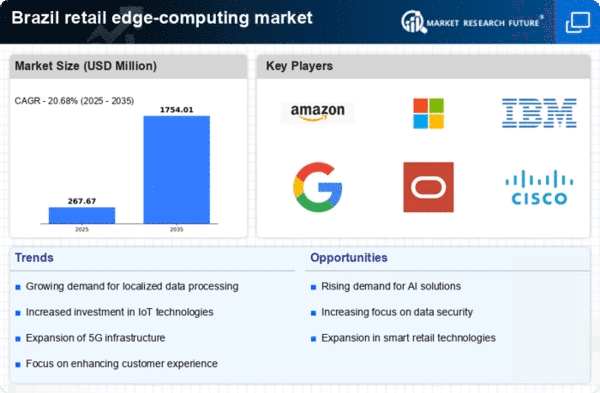Expansion of 5G Infrastructure
The expansion of 5G infrastructure in Brazil is poised to significantly impact the retail edge-computing market. With the rollout of 5G technology, retailers can expect enhanced connectivity and reduced latency, which are crucial for the effective deployment of edge-computing solutions. This technological advancement enables faster data transmission and supports a higher density of connected devices, facilitating seamless integration of IoT applications in retail environments. As a result, retailers can implement advanced analytics and automation tools that rely on real-time data processing. The Brazilian government has been actively promoting 5G deployment, which is anticipated to reach over 50% coverage by 2026. This expansion is likely to drive innovation and efficiency in the retail edge-computing market, allowing businesses to optimize their operations and improve customer experiences.
Rising Demand for Real-Time Analytics
The retail edge-computing market in Brazil is experiencing a notable surge in demand for real-time analytics. Retailers are increasingly recognizing the value of immediate data processing capabilities, which allow them to make informed decisions on inventory management, customer preferences, and sales strategies. This trend is driven by the need to enhance operational efficiency and improve customer satisfaction. According to recent estimates, the market for real-time analytics in retail is projected to grow at a CAGR of approximately 25% over the next five years. As retailers leverage edge-computing solutions to analyze data at the source, they can respond swiftly to market changes, thereby gaining a competitive edge in the retail edge-computing market. This shift towards real-time insights is likely to redefine how retailers operate and engage with their customers.
Emergence of Smart Retail Technologies
The emergence of smart retail technologies is driving transformation within the retail edge-computing market in Brazil. Innovations such as smart shelves, automated checkout systems, and personalized marketing solutions are increasingly being integrated into retail operations. These technologies rely on edge-computing capabilities to process data locally, enabling real-time interactions with customers and enhancing the shopping experience. As Brazilian consumers become more tech-savvy, retailers are compelled to adopt these smart solutions to remain competitive. The market for smart retail technologies is expected to grow by approximately 30% annually, reflecting the increasing investment in edge-computing infrastructure. This trend suggests that the retail edge-computing market will continue to evolve, driven by the need for enhanced customer engagement and operational efficiency.
Increased Focus on Supply Chain Optimization
Supply chain optimization is becoming a critical driver for the retail edge-computing market in Brazil. Retailers are increasingly adopting edge-computing technologies to enhance visibility and control over their supply chains. By processing data closer to the source, businesses can monitor inventory levels, track shipments, and predict demand more accurately. This shift is particularly relevant in a market where logistics and distribution efficiency can significantly impact profitability. Recent studies indicate that companies utilizing edge-computing solutions for supply chain management can reduce operational costs by up to 20%. As Brazilian retailers seek to streamline their supply chains and respond to consumer demands more effectively, the retail edge-computing market is likely to see substantial growth fueled by this focus on optimization.
Growing Emphasis on Sustainability Initiatives
Sustainability initiatives are gaining traction in the retail edge-computing market in Brazil. Retailers are increasingly aware of the environmental impact of their operations and are seeking ways to reduce their carbon footprint. Edge-computing solutions can play a pivotal role in this effort by optimizing energy consumption and minimizing waste through better data management. For instance, retailers can utilize edge analytics to monitor energy usage in real-time, leading to more sustainable practices. Recent surveys indicate that over 60% of Brazilian consumers prefer to shop with brands that prioritize sustainability. This consumer preference is likely to drive retailers to invest in edge-computing technologies that support their sustainability goals, thereby fostering growth in the retail edge-computing market.
















